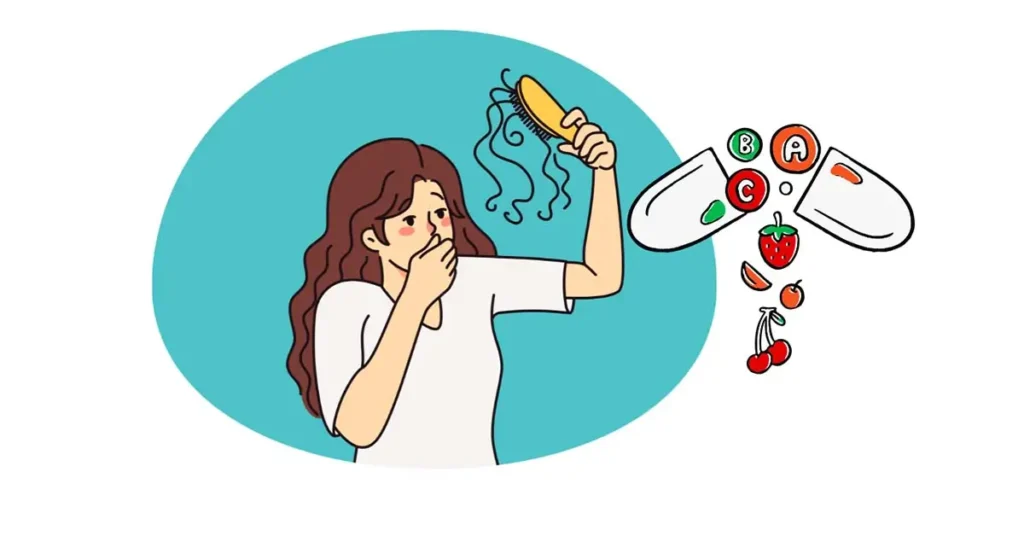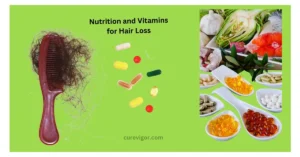Discover the crucial role of nutrition and vitamins in combating hair loss. Learn how deficiencies in vitamins and minerals like Vitamin A can impact hair health and find dietary recommendations to promote hair growth and maintain a healthy scalp.
Thank you for reading this post, don't forget to subscribe!Hair loss is a multifaceted condition often influenced by genetics, hormonal changes, medical conditions, and environmental factors. Nutrition is a pivotal element in maintaining hair health. Nutrient deficiencies can weaken hair follicles and exacerbate hair loss, making a balanced diet essential for prevention and overall well-being.
How to Understand Hair Growth and Nutritional Influence?
Hair follicles are among the most metabolically active structures in the body, requiring a consistent supply of nutrients to sustain growth. A deficiency in critical vitamins and minerals disrupts the hair growth cycle, leading to hair thinning and eventual loss. Consuming a nutrient-rich diet ensures follicular health, supports the natural growth cycle, and minimizes breakage.
Role of Vitamin A in Hair Health
Vitamin A is vital for cellular growth, particularly in tissues like hair, which undergo rapid regeneration. It facilitates the production of sebum, a natural oil that moisturizes the scalp, prevents dryness, and nourishes hair strands.
Rich sources of Vitamin A include carrots, sweet potatoes, spinach, and kale, all abundant in beta-carotene. The body efficiently converts beta-carotene into Vitamin A to support its diverse functions. However, moderation is key—excessive Vitamin A intake can cause toxicity, potentially resulting in hair loss.
Adults are advised to consume Vitamin A within the recommended daily allowance: 900 micrograms (mcg) for men and 700 mcg for women, ensuring both effectiveness and safety. By understanding and addressing these nutritional requirements, individuals can take proactive steps toward mitigating hair loss, maintaining vibrant hair, and fostering long-term scalp health.
Biotin, also known as Vitamin B7, is fundamental for maintaining hair structure. It supports keratin production, a vital protein in hair composition. A biotin deficiency can result in hair thinning and eventual hair loss, though this is rare in individuals with a balanced diet.
Familiar dietary sources of biotin include eggs, nuts, seeds, and leafy greens. While there is no specific Recommended Dietary Allowance (RDA) for biotin, an adequate intake level for adults is set at 30 micrograms per day. Supplementation should only be pursued if a deficiency is confirmed, as excessive biotin offers no additional benefits for hair health.
Vitamin C is a powerful antioxidant that protects hair follicles from oxidative damage. Its role extends to improving iron absorption, which is crucial for maintaining healthy follicles and promoting growth. Foods like citrus fruits, strawberries, bell peppers, and broccoli are excellent sources of Vitamin C. Adult men require about 90 milligrams daily, while women need 75 milligrams. By incorporating these foods into their diet, individuals can support follicular health and mitigate breakage.
Vitamin D is another critical nutrient closely tied to the hair growth cycle. Insufficient Vitamin D levels have been linked to alopecia, a condition marked by significant hair thinning. Fatty fish, fortified dairy products, and controlled exposure to sunlight are among the best ways to maintain adequate Vitamin D levels. Adults are advised to consume 600 International Units (IU) daily, increasing to 800 for individuals over 70. Given the prevalence of Vitamin D deficiency, particularly in regions with limited sunlight, supplementation under a healthcare provider’s guidance can be beneficial.
Vitamin E supports hair health by acting as an antioxidant that reduces oxidative stress in the scalp. Maintaining scalp health contributes to more substantial and resilient hair strands. Foods such as nuts, seeds, and spinach provide rich sources of Vitamin E. The RDA for adults is 15 milligrams, making it easy to incorporate into daily diets.
Combining these vitamins in a nutrient-rich diet can help prevent hair loss, promote healthy growth, and ensure the scalp remains a conducive environment for hair regeneration.
Essential Minerals for Hair Growth
Minerals are integral in maintaining hair health, supporting the growth and maintenance of strong, vibrant hair. Adequate levels of specific minerals such as iron, zinc, selenium, and omega-3 fatty acids ensure that hair follicles remain nourished and functional.
Iron is fundamental for transporting oxygen through red blood cells to the hair follicles. Without sufficient oxygen supply, hair growth slows, and shedding may increase. Iron deficiency, often leading to anemia, is a common cause of hair loss, especially among menstruating women who are at higher risk due to increased iron demands.
Iron-rich foods like red meat, lentils, spinach, and fortified cereals provide excellent dietary sources to meet the daily recommended allowance (RDA) of 8 milligrams (mg) for adult men and 18 mg for adult women. Ensuring iron intake remains consistent is crucial for maintaining active hair follicles and preventing unnecessary shedding.
Zinc is another vital mineral that supports hair tissue growth and repair while maintaining the function of oil glands around the follicles. It ensures the scalp remains hydrated and conducive to hair growth. Familiar dietary sources of zinc include oysters, beef, pumpkin seeds, and lentils. The RDA for zinc is 11 mg for men and 8 mg for women. While zinc deficiency can impair hair growth and lead to shedding, excessive zinc intake can have the same adverse effects. Therefore, achieving a balanced zinc level is key to maintaining hair health.
Selenium, with its potent antioxidant properties, protects the scalp from oxidative damage, promoting healthy hair growth. In Brazil, nuts, seafood, eggs, and selenium support the hair’s natural growth cycle by mitigating damage caused by free radicals. However, caution is essential, as selenium intake above the RDA of 55 micrograms (mcg) for adults can lead to toxicity and potential hair loss. Ensuring dietary sources are within the recommended limits can prevent complications while supporting overall hair health.
Omega-3 fatty acids, though technically not a mineral, play a complementary role in nourishing the hair, enhancing thickness, and reducing inflammation around hair follicles that can lead to hair loss. Found abundantly in fatty fish such as salmon, flaxseeds, and walnuts, omega-3s contribute to a healthy scalp environment. Incorporating these foods into one’s diet promotes robust hair growth and combats brittleness and thinning. By ensuring an optimal intake of omega-3s, individuals can achieve better scalp hydration and stronger hair structure.
Together, these crucial minerals and nutrients form the backbone of a diet designed to sustain and enhance hair growth. Striking a balance in their intake ensures the prevention of deficiencies while fostering a scalp environment conducive to vibrant and healthy hair.
Dietary Recommendations from Specialists for Optimal Hair Health
- Specialists emphasize the importance of a nutrient-dense diet as the cornerstone of hair health. A balanced diet rich in diverse food groups, such as fruits, vegetables, lean proteins, and whole grains, provides essential vitamins, minerals, and antioxidants that support the hair growth cycle. Including various nutrient sources ensures hair follicles receive the necessary components for regeneration and strength, minimizing the risk of breakage or thinning.
- Hydration is another critical factor for maintaining hair health. Consistent water intake helps to keep hair strands hydrated and supports scalp health by preventing dryness and irritation. Hydrated hair is less prone to brittleness, making regular fluid consumption a simple but effective step in promoting resilience and shine.
- Experts recommend limiting the intake of processed foods, especially those high in sugar and unhealthy fats. Such foods can lead to inflammation and disrupt hormonal balances, negatively affecting hair follicles. Individuals can reduce these risks by prioritizing whole, minimally processed foods and enhancing their overall hair quality.
- Consulting a healthcare professional is crucial before changing one’s diet or starting any supplementation regimen. Individual needs vary based on age, gender, and underlying health conditions. A professional can provide tailored advice, ensuring that nutrient intake aligns with specific requirements while minimizing the risk of over-supplementation, which can adversely affect hair health. Following these dietary principles helps create an optimal environment for healthy, strong hair.
Final Thought:
- Adequate intake of essential vitamins and minerals is critical for maintaining healthy hair and reducing the risk of hair loss. Nutrients like biotin, vitamins A, C, D, and E, and minerals such as iron, zinc, and selenium are pivotal in supporting the hair growth cycle and preventing follicular damage.
- Deficiencies in these nutrients can lead to hair thinning, shedding, or weakened hair structure, underscoring the importance of a nutrient-rich diet. However, it is equally vital to avoid over-supplementation, as excessive intake may cause toxicity or other adverse effects, including potential hair loss.
- A balanced diet incorporating fruits, vegetables, lean proteins, whole grains, and healthy fats provides a strong foundation for hair health. Such a diet naturally delivers a wide range of nutrients, supporting hair growth and overall well-being.
- Targeted supplementation can be beneficial when dietary intake does not meet specific nutritional needs. Consulting with a healthcare professional ensures personalized recommendations, avoiding unnecessary or excessive supplementation while effectively addressing individual deficiencies.
- Hair health is closely tied to overall lifestyle choices, including proper hydration, limiting processed foods, and maintaining scalp care. A holistic approach that combines good nutrition with healthy habits offers the best outcomes for vibrant, strong hair.
By prioritizing a balanced diet and seeking professional advice when necessary, individuals can cultivate beautiful and resilient hair and improve overall health. With informed choices and consistent care, optimal hair health is achievable for everyone.
Read more articles on Health Tips.
You might like to read:


